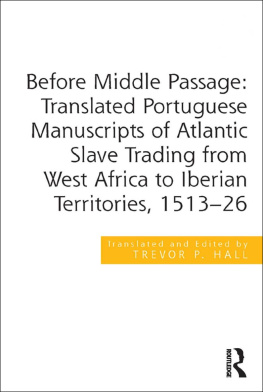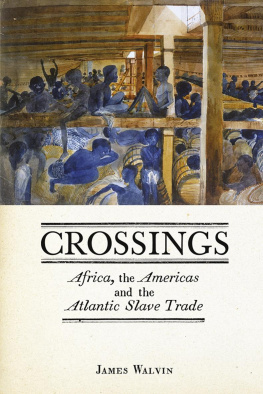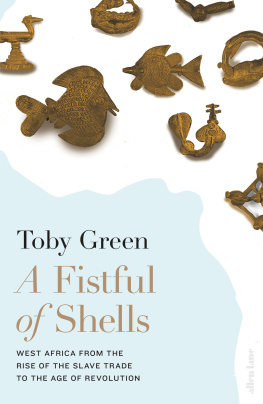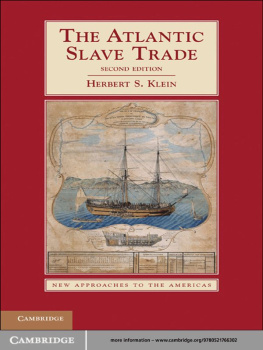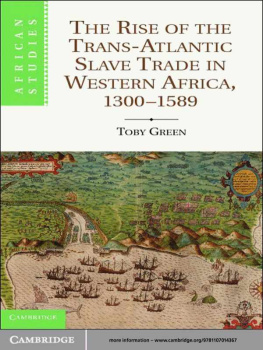BEFORE MIDDLE PASSAGE: TRANSLATED PORTUGUESE MANUSCRIPTS OF ATLANTIC SLAVE TRADING FROM WEST AFRICA TO IBERIAN TERRITORIES, 151326
Dedicated to Africans who regained their freedom and lived in Maroon Societies throughout the Americas
Before Middle Passage: Translated Portuguese Manuscripts of Atlantic Slave Trading from West Africa to Iberian Territories, 151326
Translated and Edited by
TREVOR P. HALL
First published 2015 by Ashgate Publishing
Published 2016 by Routledge
2 Park Square, Milton Park, Abingdon, Oxon OX14 4RN
711 Third Avenue, New York, NY 10017, USA
Routledge is an imprint of the Taylor & Francis Group, an informa business
Copyright Trevor P. Hall 2015
Trevor P. Hall has asserted his right under the Copyright, Designs and Patents Act, 1988, to be identified as the translator and editor of this work.
All rights reserved. No part of this book may be reprinted or reproduced or utilised in any form or by any electronic, mechanical, or other means, now known or hereafter invented, including photocopying and recording, or in any information storage or retrieval system, without permission in writing from the publishers.
Notice:
Product or corporate names may be trademarks or registered trademarks, and are used only for identification and explanation without intent to infringe.
British Library Cataloguing in Publication Data
A catalogue record for this book is available from the British Library
The Library of Congress has cataloged the printed edition as follows:
Before middle passage : translated Portuguese manuscripts of Atlantic slave trading from West Africa to Iberian territories, 1513-26 / translated and edited by Trevor P. Hall.
pages cm
Includes bibliographical references and index.
ISBN 978-1-4724-6372-2 (hardcover : alk. paper) -- ISBN 978-1-3155-6887-4 (ebook) -- ISBN 978-1-3171-7571-1 (epub)
1. Slave trade--Portugal--History--16th century--Sources. 2. Slave traders--Portugal--History--16th century--Sources. I. Hall, Trevor P. (Trevor Paul), 1953- editor.
HT1222.B55 2015
306.3620946909031--dc23
2015004399
ISBN 9781472463722 (hbk)
ISBN 9781315568874 (ebk-PDF)
ISBN 9781317175711 (ebk-ePUB)
Contents
Acknowledgments
Many colleagues have made this work possible; however, all errors in translations of the two Portuguese documents must be laid at the feet of this author. I express my gratitude to numerous professors at The Johns Hopkins University, where the transcriptions and translations began with research on Portuguese Trade with West Africa, 14411616. During the 1980s, while researching in the Portuguese national archive, Arquivo Nacional da Torre do Tombo, in Lisbon, I encountered a manuscript with the Cape Verde customs receipt book for 151316, and realized its importance in the history of West Africans and Europeans. I would like to thank Professor Orest Ranum, who introduced me to paleography at The Johns Hopkins University. I would also like to thank Professors David W. Cohen, Richard Kagan, Jack P. Greene, and Dr James D. Goodyear. My gratitude goes to The Johns Hopkins University for providing an atmosphere where extended archival research is supported and encouraged.
Many institutions provided financial support in the forms of fellowships and scholarships, including a Fulbright-Hayes research fellowship to Portugal, Fundao Calouste Gulbenkian in Portugal, the University of California at Santa Barbaras department of Portuguese, and the University of Virginia and its Carter G. Woodson Institute for Afro-American and African Studies. Multi-year financial support from The Johns Hopkins University enabled years of archival research in Portugal. The University of MassachusettsDartmouth provided assistance during the final editing of this work.
My gratitude also goes to staff in Portugals archives and libraries. Special thanks to Portugals national archive, the Arquivo Nacional da Torre do Tombo, which permitted me to microfilm the Cape Verde customs receipt book and other manuscripts. I also thank the Biblioteca da Ajuda, Arquivo Distrital de vora, Biblioteca Nacional de Lisboa, and Biblioteca da Sociedade Geografia de Lisboa.
Finally, I thank Ms Marsha Havens for editing the manuscript, and Professor Rita Costa Gomes of The Johns Hopkins University for assistance in translating exotic sixteenth-century Portuguese words to modern English.
Preface to the Translations
This book translates a customs receipt book from the Portuguese colony in the Cape Verde Islands for the years 1513 to 1516, and it also translates sections of an onboard log of a ship that sailed from Portugal to West Africa, where it purchased enslaved Africans in Sierra Leone and Guinea Bissau in 1526. The customs receipt book documented taxes collected by Portuguese customs officers based in the Cape Verde Islands. From 1513 to 1516 Cape Verde colonists outfitted thirty-eight vessels that sailed to West Africa, where they secured 3,166 persons whom they transported to the Cape Verde Islands as slaves. The translations reconstruct how Cape Verde customs officers collected taxes on the captive Africans. The taxes went to the Portuguese government and the Order of Christ, an organization of Portuguese Catholic knights. Cape Verde-based Portuguese customs agents recorded the taxes they collected in a receipt book that survived for over five hundred years, and is still housed in the Arquivo Nacional da Torre do Tombo, in Lisbon.
The translated Cape Verde customs records focused on vessels outfitted in the islands that traded in West Africa and returned to pay taxes. The King of Portugal, who owned the Cape Verde Islands, commanded his tax collectors to record the names of ships, their outfitters, officers, crew, traders, and date of arrival and departure. The head customs officer or almoxarife examined each living captive African and all merchandise and then assessed a monetary value of each. Customs officers also recorded the status and profession of some traderswhen the men declared enslaved Africans and merchandise and paid customs duties. Sometimes the scribes gave the age, gender, and health status for the captive Africans; however, not one African was called by name or identified by ethnic group.
In 151316 Cape Verde customs officials accepted payment in cash but preferred taxes in-kind. On imports from West Africa, customs officers found innovative methods to separate enslaved Africans into four groups, keeping one group as the governments quarto a 25 percent tax. The Portuguese government also collected the vintena a 5 percent import tax going to the Order of Christ. Traders who declared twenty or more enslaved Africans gave the Order of Christ one African as the 5 percent import tax. On a few occasions the customs records listed men who had transported horses from the Cape Verde Islands to West Africa, returning with four or five captive Africans whom they received for each horse.
Part 2 of the translated Cape Verde customs receipt book named traders who sailed from Europe to the Cape Verde Islands to purchase enslaved Africans whom they then transported to Portugal, Spain, and insular European colonies in the Azores and the Spanish Canaries. Iberian merchants also transported enslaved Africans to the Portuguese colony in the Madeira Islands, but their actions do not appear in these Cape Verde customs records, suggesting that the colonists in the Madeiras enjoyed a royal tax waiver on importing captive Africans. European ships delivered tons of food, wines, textiles, and manufactured goodsespecially supplies for shipsto the Cape Verde colony. The merchants paid Cape Verde customs a

